Earlier this week I visited Latoa’s Nursery school where Tammy and Aileen have been volunteering. The school is held in a church about a forty minute walk off the main road and serves orphan children too young to attend public school from the surrounding community. Every day, these children gather from their foster homes at 8:30 AM till 12:00 PM.
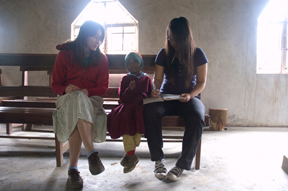
When we arrived, the children were already sitting in the pews on one side of the church. Their local teacher began the day with numbers in English, a task that on and off, continued all morning. Tammy and Aileen at first walked around encouraging children to pay attention and doing conflict resolution when a few of the nearly 60 students got a little too ruff with their peers. The children in the front were much more well-behaved but didn’t manage to avoid the teacher’s stick any more than the unruly children in the back of the class. This was the first time I was introduced to use of the stick, which over the course of this week, I’ve come to see as a desired practice among teachers and parents. As I began to follow the teacher’s stick, I began to recognize many more in different shapes and sizes tucked into the backs of pews all over the room. The sticks were used for any number of reasons, most that I didn’t understand or didn’t see the gravity of the situation most likely from the cultural and language barrier. As the class progressed, Tammy and Aileen taught some children beginning math and reading, and participated in activities like the ever popular “Head, Shoulders, Knees and Toes.”
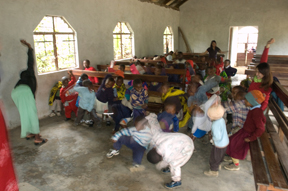
Near mid-morning, after the children had had a slight break, the teacher suddenly decided to take roll, something she had never done in the last two weeks our volunteers were there. It was quite a comical scene actually—60 kids sitting, growing increasingly bored, screaming out “present” just to repeat the teacher or each other. When she got to a little girl in the front, the girl fell silent, and out came the stick again. After softly slapping her and pinching her cheeks, the teacher received a quiet reply muffled by tears. That girl didn’t smile again that day. Roll took nearly an hour, in which resolving fights and consoling crying little ones was our main work. The teacher says since the ugi (the children’s’ daily porridge that serves as a very watered down mid-morning meal) ran out last week, they haven’t been able to buy more and the kids have been unmanageable. They are just hungry, it’s understandable, and sadly it’s not an uncommon situation here.
Teaching is quite a different scene here, and even though the children seem to love to learn, the whole atmosphere around learning is much more strict and rigid than we would tolerate back home. In contrast, teachers’ attitudes towards playtime are much more relaxed and indifferent.
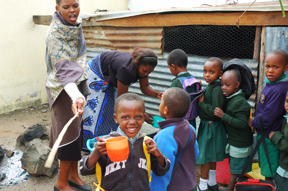
Another of our partner organizations, Women In Action (WIA), has a nursery school that seems to reflect some of the same principles and methods of teaching as Latoa. At WIA, there are three teachers and Lindsay, an Arusha Project volunteer, for about 100 kids. Every day, the children take a Mercedes Benz school bus that mimics an elegant tour bus for 30 minutes from the city centre. The children that WIA cares for are orphans or children of parents who have aids. Some of the children are infected themselves. One little girl kept telling us her wounds hurt, she had spots on her head that were bald and scabbed and she was evidently quite sick.
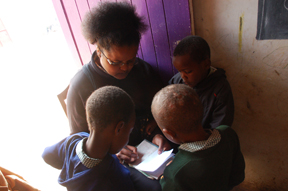
During the morning, Lindsay often takes over the entire class, teaching them vowels, letters, colors, etc. and correcting homework. She works mainly with one a female teacher that she describes as good but tough. Let me give you an example. When asking the kids to get out their pencils, she started yelling to the lagging students, “Show me your pencils or I’ll beat you” (translated from Kiswahili). It’s not a phrase I fully believe she would have followed up on, but it certainly got everyone’s attention. I ever actually saw her use her stick, but Lindsay says it’s not too uncommon. I’ve realized it’s more of a way to gain respect than anything else and the teachers here do know how to make their kids act, although they get their desired results through forceful methods Americans would deem shocking and old fashioned.
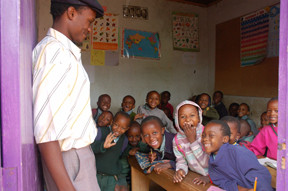
The parents approach learning with little difference. This particular morning, a grandmother dropped off her granddaughter and directly approached Lindsay, asking her to please beat her child so she will improve her studies, as she’s not satisfied with her performance. It was a bit shocking and gave us a little more insight into what happens to some of these kids at home.
However, WIA was also the first place I saw a teacher be actually kind and caring. The male teacher was probably the most gentle man I’ve met here, and the older female teacher was an incredibly nurturing character. I have no doubt that they too follow the cultural norms of teaching, but balance the stick with love and encouragement.
-Kaia
1 Comment so far
Leave a comment
Hi All,
We got back from Arusha last week having spent a month working in Faraja Orphanage. We lived with Joanna who I know is working at Latoa. I am pleased to hear that the school is moving into new premises next week. We have funded the desks and seating and blackboards for the school and also donated a large amount of toothbrushes and reading glasses to the Latoa project. We had a fantastic time in Arusha and feel that the trip and fund-raising was worthwhile and can’t wait to return in the future when time and cash allow. We also met with Lisa who was working at TUPO project close to where we were living. She mentioned you guys in passing and was thinking about going to Nairobi for an HIV conference but I don’t think she made it up there. Keep up the good work and enjoy your time in Africa. It is a special place and after our fourth visit is now well embedded in our hearts and minds.
Best Wishes
Comment by HelenRoss July 10, 2007 @ 12:30 pmHelen